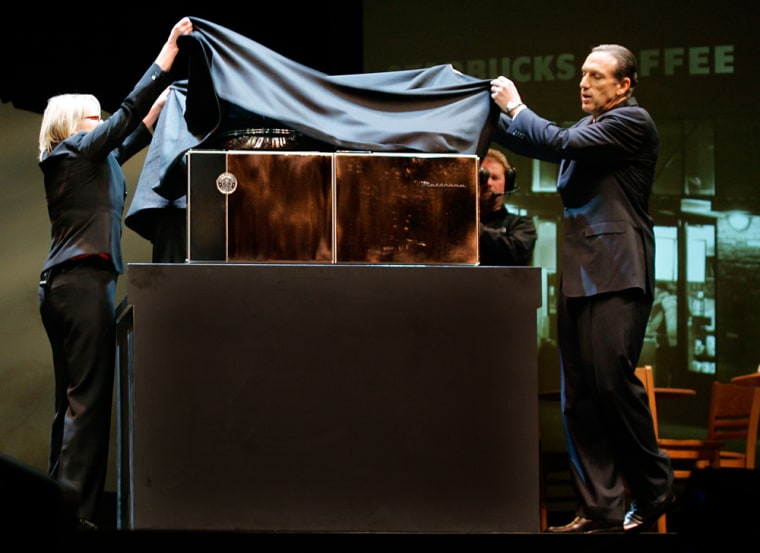Starbucks on Wednesday introduced a host of new changes designed re-energize its slumping business and keep customers coming in despite tough economic times, including a plan to offer perks to its most loyal customers.
Speaking at the company's annual shareholders meeting, Chief Executive Howard Schultz said the company would begin giving people who register their refillable Starbucks cards deals such as a free shot of syrup flavoring with their regular latte, or a free brewed coffee refill during their visit. The changes will take place in April.
Schultz also introduced a new automated espresso machine and said the company, which has faced questions about its coffee quality, would get back to grinding beans in its stores.
Starbucks' chairman and chief executive was facing thousands of shareholders eager to hear the company's plans for its beleaguered U.S. business and strategy for propping up its share price, which has fallen sharply in the last year and a half.
Schultz announced the arrival of the Mastrena, a new machine designed to leave a smaller margin for error in pulling shots and steaming milk.
While likely to disappoint some longing for the return of old-school manual machines, the Mastrena is about seven inches shorter than machines in stores now, making it easier for baristas to interact with customers.
"It's not just a piece of equipment," Schultz said of machine made by Thermoplan, the same Swiss company that makes Starbucks' current machines. "It's an unbelievable tool that will provide us with the highest-quality, consistent shot of espresso that will be second to none."
In an interview with The Associated Pres before the company's annual shareholders' meeting, executives said the company will also quit using flavor-locked bags of pre-ground coffee next month. Instead, it will grind beans in most of its U.S. stores to bring back the aroma that's been missing since it started using sealed grounds years ago.
Michelle Gass, Starbucks' senior vice president of global strategy, said she expects the change will improve sales, which have been slipping amid a softening economy and growing competition from cheaper rivals.
Starbucks' stock has been falling steadily for more than a year, losing more than half its value since late 2006, when it was trading at close to $40 a share.
Most retailers have taken a serious hit amid a downturn in the housing market, rising gasoline and food prices, and a widening credit crunch.
But Schultz, who returned as CEO in January after Starbucks forced out his predecessor, Jim Donald, has argued that Starbucks' bigger problem was that it spent the last few years focusing too much on growth and not enough on coffee and customers.
To get a better idea of what customers want, the company is launching its first-ever social networking site. Chris Bruzzo, Starbucks' chief information officer, said mystarbucksidea.com will be "about sharing ideas, voting, getting into a conversation about sharing those ideas, then putting those idea into action."
Starbucks also is introducing a new "everyday" drip coffee — a signature brew called Pike Place Roast that baristas will serve up daily in all its stores — rather offering new blends from day to day.
"As we talked to customers over the last year, what we heard was that the morning occasion was very, very habitual and they want a taste they can count on," Gass said.
Customers will have two other choices for drip coffee: one other caffeinated variety and one decaf.
Pike Place Roast — named for the company's first store in Seattle's storied public market — is the first coffee made entirely of beans purchased through the company's sustainable growing practices program — its version of fair trade and organic. Starbucks currently buys about 65 percent of its beans from farms that win higher prices for doing things like paying its pickers well and growing their coffee in shade without using pesticides.
Starbucks has made several other moves in recent months hoping to turn its business round, from scaling back growth in the U.S. and closing poorly performing stores to rolling out limited free wireless Internet access in most U.S. stores beginning this spring. It has also tested $1 "short" cups of drip with free refills in Seattle to see if a discount can lure in penny-pinching customers.
Schultz said more changes are in store, including an entry into the fast-growing energy-drink market later this year, though he said no details would be announced Wednesday.
